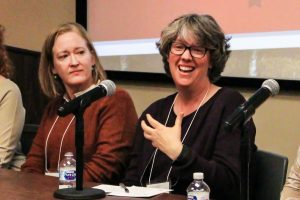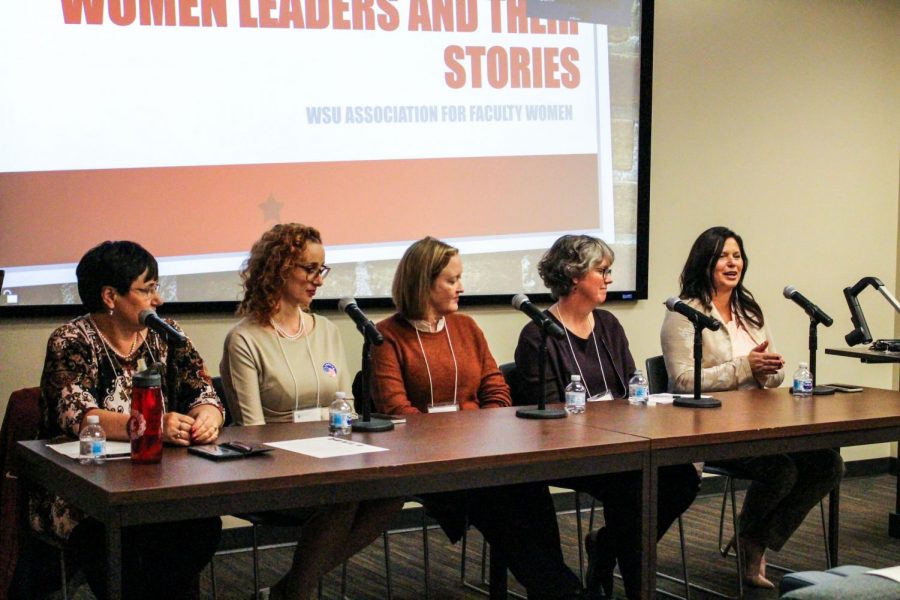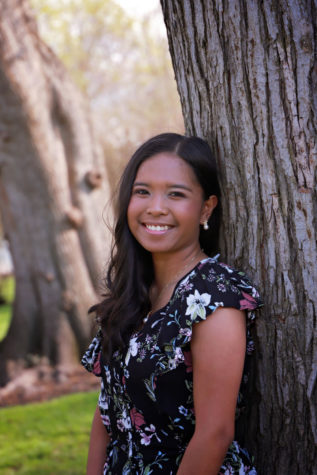Panel of leaders share stories
Panelists gave advice for other women in leadership, discussed challenges
A panel of members from the Association for Faculty Women explain how mentees can get the most out of their mentors Tuesday evening at the Bundy Reading Room at Avery Hall.
November 6, 2019
Five WSU women faculty members shared personal stories about their career experiences during the Association for Faculty Women’s Pathways to Leadership: Women Leaders and their Stories event Tuesday night at Avery Hall.
Anne Cox, AFW president and associate professor of kinesiology, said the event brought women together and illustrated the different leadership pathways they can take. It gives both the attendees and panelists an opportunity to support each other in their career journeys and trajectories.
“I think there can be an impression that people just advance in a really smooth and linear fashion,” Cox said. “So hearing more of those details I think is something that you don’t always get in other venues or other types of events.”
The panel consisted of Noel Schulz, WSU first lady; Melanie-Angela Neuilly, interim associate vice provost for faculty development; Courtney Meehan, associate professor of anthropology; Monica Johnson, Department of Sociology chair; and Zoe Higheagle Strong, Center for Native American Research and Collaboration director.
Panelists discussed the challenges they have experienced and advice for other women in leadership.
Schulz said one of the biggest lessons she learned was understanding that not everyone shares her perspectives. This lesson helped her focus on what she can influence and control. She also learned the importance of communication.
“It’s better to over-communicate than under-communicate,” she said. “I think that’s one thing that sometimes leaders think everybody knows everything, and we don’t know everything.”
Neuilly said it is important to trust one’s self and for a person to be confident in his or her ability to overcome a challenge. She also said it is important for people to know the purpose of what they are doing. Knowing “the why” helps alleviate challenges and makes them worth it, she said.
“If you don’t know your why, then nothing is going to be easy, and nothing is going to happen and fall in place,” she said. “It will make you a better fit for what you’re doing, and it will help you make the decisions you need to make.”

Courtney Meehan, left, and Monica Johnson, members from the Association for Faculty Women, share experiences they have had with sexism and how they confronted it on Tuesday evening at the Bundy reading room.
Higheagle Strong said building relationships is valuable. She said this lesson stemmed from her experience with research and creating a nonprofit that serves youth and adolescents in the northwest.
Relationships are necessary in order for a team to progress, she said. This requires getting to know people and listening to what they have to say. She has incorporated this into her personal life, dedicating her weekends and holidays solely to her family.
Johnson talked about choosing which leadership positions and career opportunities to take. She said she would ask herself why she wanted to do a specific job and what she wants to do with that opportunity. This has helped her become deliberate with her decisions.
“If you’ve done well at one thing, you’re going to get asked to do more,” she said. “You’re often in the position of making choices, and you can’t do a good job if you say yes to too many things.”
Meehan said she has faced many challenges when she became associate dean for the College of Arts and Sciences. She said working as a mom while maintaining her research and teaching endeavors has been a struggle. However, last month, she met with some colleagues and realized others were going through the same experience.
“I realized there and then that we should not keep that private, that we should communicate it, and let other people know because there is a tremendous amount of support out there that we probably don’t seek or know about,” she said.










